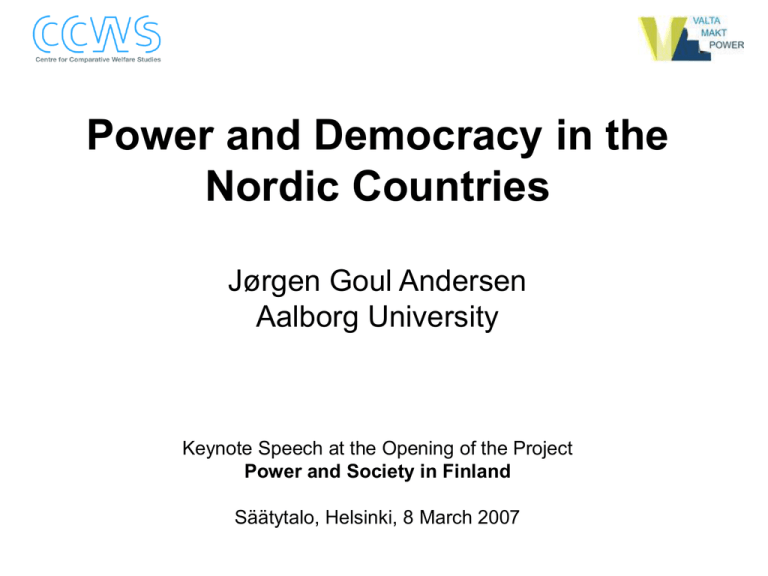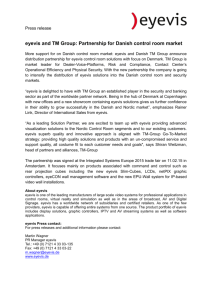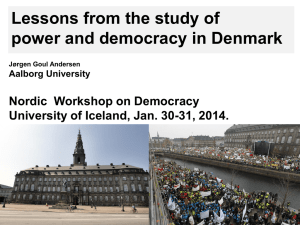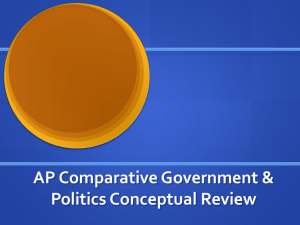Valta Power and Democracy in the Nordic Countries
advertisement

Power and Democracy in the Nordic Countries Jørgen Goul Andersen Aalborg University Keynote Speech at the Opening of the Project Power and Society in Finland Säätytalo, Helsinki, 8 March 2007 The Nordic democracies always described as more close to democratic ideals than other countries: • Strong representative democracies resting on a solid popular base • Strong governments resting on a belief in The Possibility of Politics (Ringen, 2006). • Strong mass based parties and people's movements leading to high and equally distributed political participation. • Supported by high economic equality ensured by solidary wage policies and redistribution via the tax/benefit system. • Low levels of poverty. High levels of gender equality. • Relatively strong regulation of business to make it comply with social goals. • High political literacy, engagement and participation in elections. • Trust in politicians who are uncorrupt and democratically accountable. • And rich economies with a high capacity to secure the welfare of the citizens. At least by comparative standards, the Nordic democracies remain quite healthy • This is well-documented for Norway, Sweden and Denmark. We know less about Finland and look forward to the results generated by this big research programme in the next four years. But from what we already know, we would be surprised if this overall conclusion was not largely supported in Finland as well. Troubling observations and challenges • troubling observations in most countries: - Declining party membership, declining electoral participation and declining political trust - Weakening of voluntary associations - Concentration of economic wealth and power. • a number of challenges: - Internationalisation: Economic globalisation/ European integration - Changes in decision making structures - Immigration and multiculturalism - Individualisation - Decline of class-based politics. • These worries and these challenges have been among the main arguments for mapping the power relations in society and for assessing the state of democracy in the last generation of the Nordic power and democracy studies, including the current Finnish one. Among the members of the ad hoc Committee of the Danish Parliament which initiated the Danish power project, there clearly was a feeling of losing power, and more generally, there is a feeling that there are increasing threats to the democratic idyll in the Nordic countries. • In the following, I shall try - however incompletely - to summarize a little bit of the evidence from the previous studies. I shall also reflect a little bit about which new subjects were added by the different generations of power projects. Finally, I shall also comment a little bit on methodology. As some of you might know, the latest round of Danish and Norwegian projects were carried out at exactly the same time but reached quite different conclusions • To begin with the main subjects, concepts and theories of the power projects, there are some marked differences, but also a lot of cumulativeness between the Nordic power studies. • It all began with the Norwegian study 1972-1980 which was really impressive in its conceptual achievements, guided not least by organisation theory - but perhaps slightly less impressive in its empirical findings. They described the corporatism of the Norwegian society, they launched new concepts and analyses of the negotiated economy, segmentation and routine politics. They launched the idea of grass-root actions - or ad hoc participation - as an independent form of political participation - and partly as an effect of segmentation and routine politics that would leave some issues outside. They also addressed the issue of the mediadistorted society. • But perhaps most importantly, they coined the concept of the Parliamentary chain of governance which served to structure the entire description. The Parliamentary chain of governance is an ideal type which roughly speaking summarizes democracy according to the constitution: Parliament is elected by universal suffrage and responsible to the people; Government is responsible to Parliament and controls the Administration. The administration is unpolitical, carries out the law, directed by the minister, and bureaucrats cannot take any action unless the law grants them the right to do so the principle of legality. In short, the parliamentary chain of governance describes the rights of democratic accountability. • As an ideal type, The parliamentary chain of governance is extremely well suited for describing all sorts of deviance. However, it should be underlined that it is an ideal type which has never existed - it is not a description of the past. For instance, all sorts of other actors had influence 100 years ago, and the early welfare state was a bunch of strange mixes between public and private insurance arrangements. Secondly, it should be underlined that it is an ideal type, not an ideal. In particular, it sketches a rather elitist model of democracy that does not grant the people much influence in between the elections. • However, at a subconscious level, the ideal type may easily come to be perceived both at an ideal and as something real. In that case, we easily come to compare current reality with an idealised and distorted image of a golden age. • I can just add that I happened to be a member of a somewhat smaller (but still unusually big) Danish "power project" 1978-1982 which actually replicated a good deal of the data collection of the Norwegian project. The most original result, however, probably was the finding that wherever we sought to measure power perceptions, we always found the feeling that "power belongs to the others". The Swedish project 1985-1990 was also innovative: • It studied political participation and political culture under the headline of Citizenship. • It introduced the notion of small-scale democray as a way of getting influence in daily life, at the workplace, in service institutions, etc. • It illuminated the limits of state power and planning - and the alienating and disempowering effects of the big welfare state (the people's home). • It emphasized the "soft" forms of power such as the power of discourse and ideas. • And not least, it put gender inequality close to the top of the priority list. • Conceptually, the Norwegian and Danish projects 1998-2003 were probably less innovative. But the problems addressed were new: What was the effect of economic globalisation, Europeanisation, Internationalisation, Immigration, individualisation, concentration of economic power, etc. • As to economic globalisation, there has been agreement that it represents a qualitative change with deep impact on society. But there is also agreement that as small, open economies, the Scandinavian countries are well acquainted with intense competition. Further, the direct impact on the tax/welfare system, or on equality is exaggerated, or tantamount to blame avoidance. All agree that many theories about negative effects of globalisation on the welfare state are exaggerated • The Danish and Norwegian reports disagree slightly, however, as regards the impact on equality. Is increasing inequality an unavoidable effect? Personally, I would argue that increasing inequality is much more attributable to political factors. That tax competition does not lead to a "race to the bottom", and that this becomes obvious when we look at the intervening mechanisms. • Everybody would agree, however, that there is a certain decline in the level of ambition of macroeconomic steering, and that the number of instruments at the government's (or National Bank's) disposal has declined. In the Danish case, however, the stabilisation of the economy coincides with the decline in instruments available for economic stabilisation policy. Other fields of agreement • Everybody agrees that Europeanisation is important. However, one should not be misled by purely quantitative accounts. A study of some of the most important political decision-making processes in major reforms in Denmark reveals that the European perspective plays a wholly insignificant - and actually declining - role. • Increasing judicialisation is a common trend in Denmark and Norway. The Norwegian project has put particular emphasis on the development of international law without any control by parliaments, for instance in the field of human rights. I think this is a very subtle and thought-provoking analysis; the only question is how much this should count in the overall picture. • There is also agreement that there is a considerable concentration in business life. • And there is agreement that the market has overall gained importance. Not only vis-a-vis the state, but also in the management of the state, e.g. in the shape of privatisation, outsourcing, new public management etc. The Norwegian project speaks of a certain "hollowing out of the state" - vis à vis the international level, and vis à vis the market. • But there is disagreement about how these trends should be interpreted! Three selected priority areas of the Danish project: • Immigration. This has completely changed the political conflict structure in Denmark. It has generated a new form of inequality and the threat of an underclass. Citizenship of immigrants become a central concern. • Studies of Political Decision-Making Processes. • Diversified studies of Media and Media impact: - Campaign Journalism - Routine Journalism. News criteria, news routines - Interaction between politicians using media and media using politicians - Reception of information from media, and influence on citizens: Competent citizens - Key Decisions: Media often absent! Not much agenda setting on most important issues How should changes be interpreted? 1.Increasing deviation from the parliamentary chain of governance? • • • • • • If one makes a very systematic account, one can assess how much increased deviation from the parliamentary chain of governance. The Norwegian project finds a lot of increasing deviation. The Danish project finds few if any NET changes. Part of the explanation is variation in the assessment of the evidence Part of the explanation is that the Danish and Norwegian situation is different. Specific differences + Differences in timing Taking a very broad view, Denmark has in many respects been the political forerunner in Scandinavia. In building modern political institutions. And in dismantling them. decline in parties occurred early. parties have learned to live with it political distrust and electoral volatility occurred early. weak minority governments came early. Learned to govern anyway! European Union membership is not new 2. Should the Parliamentary Chain of Governance be the normative Standard of Evaluation? I think not: (1) It is not an ideal. But unconsciously come to serve as an ideal (2) It has never been an adequate description of the past - idealised past / golden age problem (3) It too much involves taking criteria of the past for assessing the present. You can hardly avoid seeing decline rather than change. • • Point of departure: Multilevel governance: The right question is not to ask whether the nation-state has lost power but whether there is adequate democratic control at the other levels of govermance. As such, there is not a decline in democracy by making decisions at a European level. It might even be more democratic, if it is at this level we find the capacity to deal with the problems. Functional equivalence: What disappears, what replaces it? - Linkage between political decision makers and the citizens. - Decline of parties. Is there any replacement. How does it work? - Does increased participation at the outcome side serve as a replacement for decreased participation at the input side of politics? - Are there new forms of participation building up to replace those which decline? - Decline in class based politics. But in return increasing social equality in other forms of participation • New democratic criteria: Deliberation, participation, dialogue. Responsive government. Is there a public debate? The parliamentary chain of governance has nothing to say about this. • New democratic problems in the speed of change in decision-making. And we even noted that the media were often absent in these processes. Almost strengthening of the parliamentary chain of governance – but not of the quality of democracy





